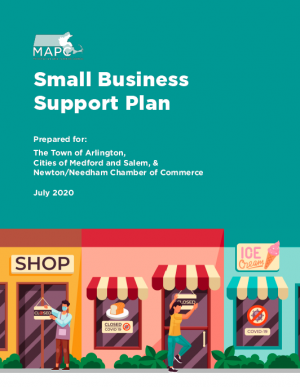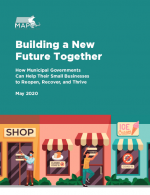
Small Business Support
How can cities and towns help the small businesses in their communities survive through COVID-19 and reopen when social distancing becomes less necessary?
In July 2020, MAPC published a small business support plan for Salem, Arlington, Medford, and the Newton-Needham Chamber of Commerce.
The project was initiated and led by the City of Salem and is funded by District Local Technical Assistance (DLTA).
MAPC is helping municipalities understand the needs of businesses in their communities, planning for an efficient reopening process, and recommending what kinds of assistance businesses will need to stay open.
As the situation changes in real time and municipalities need immediate solutions, MAPC will be providing recommendations and data throughout the planning process. As the planning process continues, we hope that our work can act as a template for other municipalities.
Questions?
MAPC stands ready to assist your community and the region during this time.
If you have questions or would like to work with MAPC on a small business response plan, contact Economic Development Manager Betsy Cowan at [email protected].
Small Business Support Plan
July 2020
MAPC's Small Business Support Plan examines the existing conditions and key needs in Arlington, Medford, Needham, Newton, and Salem and provides recommendations for cities and towns to increase revenue for small businesses, decrease the cost of doing business, and protect public health and safety.

Plan for Reopening
Once social distancing is no longer necessary and non-essential businesses reopen, cities and towns will need to quickly conduct inspections and issues licenses and permits. The support plan includes recommendations for municipal staffing, coordination, and communication during
this time.
Understanding Need
The experts on what small businesses need to reopen are the small business owners and employees themselves. MAPC is providing templates and analyzing surveys to make recommendations based on the specific needs of local businesses. In the support plan, MAPC highlights the small business landscape and key needs in each of the cities and towns.
Short- and Long-Term Assistance
Our support plan provides recommendations and resources for how municipalities can assist small businesses. These include:
- Community Development Block Grants through HUD
- Direct financial assistance programs
- Regulatory relief: tax abatement, reducing license and permit fees
- Policy changes to support small businesses long-term
- Reopening assistance, coalition building, and infrastructure support
Resources for Municipalities
Survey template
This sample survey can help your city or town understand the impacts of COVID-19 on small businesses. Please amend it to fit your own needs!
Building a New Future Together
 Municipal government has a key role to play in helping small business to reopen, recover, and thrive well into the future.
Municipal government has a key role to play in helping small business to reopen, recover, and thrive well into the future.
MAPC's "Building a New Future Together," released on May 12, 2020, contains recommendations for how municipalities can facilitate small business reopening and recovery.
Resources for Small Businesses
MAPC is currently compiling a list of national, state, regional, and local resources for our communities. As we learn more about additional programs, we will be sure to include them in this list.
If you have any additional resources, or have any questions, please don’t hesitate to contact Chief of Economic Development Betsy Cowan at [email protected].
Local Initiatives Support Corporation (LISC)
Small Business Recovery Grants for Massachusetts
LISC will be offering grants of up to $10,000 to address immediate financial peril, limit layoffs, avoid gaps in employee benefits or insurance, mitigate economic instability and increase the likelihood of business survival. The link to the application will be available online beginning Monday, April 20, and will close on Friday, April 24, and can be found here: https://www.lisc.org/boston/covid-19/small-business-recovery-grant-program/
Small Business Relief Partnership Grant Program
The Massachusetts Office of the Attorney General (AGO) has committed $500,000 to assisting municipalities and regional planning agencies with the provision of financial relief to local small businesses most impacted by closures, policies, or general loss of revenue due to COVID-19. Municipalities and regional planning agencies will be awarded funds up to $50,000 per request to administer or supplement a grant program targeting local small businesses that have been impacted by COVID-19.
US Chamber of Commerce coronavirus webpage
- To qualify for the fund, you must employ between 3 and 20 people, be located in an economically vulnerable community and have been harmed financially by the COVID-19 pandemic.
Bartender Emergency Assistance Program
United States Bartenders Guild (USBG) is offering emergency grants for bartenders.
Bartenders, their spouses, or their children can apply for a grant through the Bartender Emergency Assistance Program. Grants are paid directly to recipients who have shown immediate hardship due to COVID-19 within four (4) to six (6) weeks of approval.
Restaurant Employee Relief Fund
Through this Fund, grants will be made to restaurant industry employees who have been impacted by COVID-19, including a decrease in wages or loss of employment. Grants will be awarded as soon as possible to those individuals who meet the prescribed eligibility criteria, as reviewed and verified by the National Restaurant Association Educational Foundation.
Boston Main Streets Foundation (BMSF) COVID-19 Emergency Response Fund
BMSF has established a $100,000 response fund to distribute $1,000 grants to individual businesses, based on specific conditions, which may be found here: https://bostonmainstreets.org/covid/
SBA Financial Assistance
The MA Emergency Management Agency (MEMA) and Baker-Polito Administration are working closely with the U.S. SBA to activate the Economic Injury Disaster Loan (EIDL) program which would provide assistance to eligible businesses and non-profits impacted by COVID-19.
- The first step in this process is to meet a minimum threshold of affected businesses within MA.
- Affected small businesses and non-profits should download, complete, and submit the SBA EIDL Worksheet (https://lnkd.in/ewF7VBy ) and Instructions to expedite activation of the EIDL program.
- Completed forms can be submitted by email to [email protected] or by fax to (508) 820-1401. If you do fax the form, please include your email. Please note, this initial survey form is not an SBA loan application.
- When the EIDL program is activated, you will be contacted to apply directly to the SBA and this website will be updated with application details. For questions, please contact [email protected]
- About the EIDL program: EIDLs provide small businesses with working capital loans of up to $2 million to help meet financial obligations and operating expenses until normal operations resume.
Other SBA Programs include:
- The Paycheck Protection Program is a loan designed to provide a direct incentive for small businesses to keep their workers on the payroll. As of 4/24/2020, the PPP program has been funded for an additional $310 billion.
- SBA Express Bridge Loans: Enables small businesses who currently have a business relationship with an SBA Express Lender to access up to $25,000 quickly.
- The Economic Injury Disaster Loan Advance: A Loan Advance of $10,000 that is available to applicants who have been approved for an Economic Injury Disaster Loan; it does not need to be repaid, so you can think of the Advance as a grant for business expenses.
- SBA Debt Relief Program: This debt relief program will automatically pay the principal and interest for six months beginning March 27th, 2020 for qualifying new and current holders of 7(a) loans, 504, and microloans.
Coronavirus (COVID-19): Orientación y recursos de préstamos para pequeñas empresas
Los funcionarios de salud y gubernamentales están trabajando conjuntamente para mantener la seguridad, protección y salud del público. Se alienta a las pequeñas empresas a poner de su parte para mantener saludables a sus empleados y clientes.
El Programa de Protección de Salarios
El Programa de protección de salarios proporciona fondos a las pequeñas empresas para pagar hasta 8 semanas de costos de nómina, incluidos los beneficios. Los fondos también se pueden utilizar para pagar intereses hipotecarios, alquileres y servicios públicos.
IRS
- Employee Retention Credit: The Treasury Department and the Internal Revenue Service launched a refundable tax credit is 50% of up to $10,000 in wages paid by an eligible employer whose business has been financially impacted by COVID-19.
- Credit for Sick and Family Leave Small Business Protection: For COVID-19 related reasons, employees receive up to 80 hours of paid sick leave and expanded paid child care leave when employees' children's schools are closed or child care providers are unavailable. Employers with fewer than 50 employees are eligible for an exemption from the requirements to provide leave to care for a child whose school is closed, or child care is unavailable in cases where the viability of the business is threatened.
IRS (Servicio de Impuestos Internos)
-
-
-
-
- Crédito de retención de empleados: El Departamento del Tesoro y el Servicio de Impuestos Internos publicaron un crédito tributario reembolsable es del 50 por ciento de hasta $10,000 en salarios pagados por un empleador elegible cuyo negocio ha sido afectado financieramente por COVID-19.
- Licencia pagada por enfermedad y licencia de cuidado infantil extendida (Protección para pequeñas empresas): Por razones relacionadas con el COVID-19, los empleados reciben hasta 80 horas de licencia pagada por enfermedad y licencia de cuidado infantil extendida cuando las escuelas de los hijos están cerradas o los proveedores de cuidado infantil no están disponibles. Los empleadores con menos de 50 empleados son elegibles para una exención de los requisitos para dar permiso para cuidar a un niño cuya escuela está cerrada, o el cuidado infantil no está disponible en los casos en que la posibilidad del negocio se ve amenazada.
-
-
-
The WorkShare program is an alternative for employers faced with a cut in workforce. Employers can divide available work between affected employees instead of laying off workers. It allows employees to receive a part of their unemployment insurance (UI) benefits while working reduced hours.
Small Business Owner’s Guide to the CARES Act: Information about the major programs and initiatives available from the Small Business Administration (SBA), including for 501(c)(3) nonprofit organizations with fewer than 500 employees
Loans Available for Nonprofits in the CARES Act: Guidance from the National Council of Nonprofits
